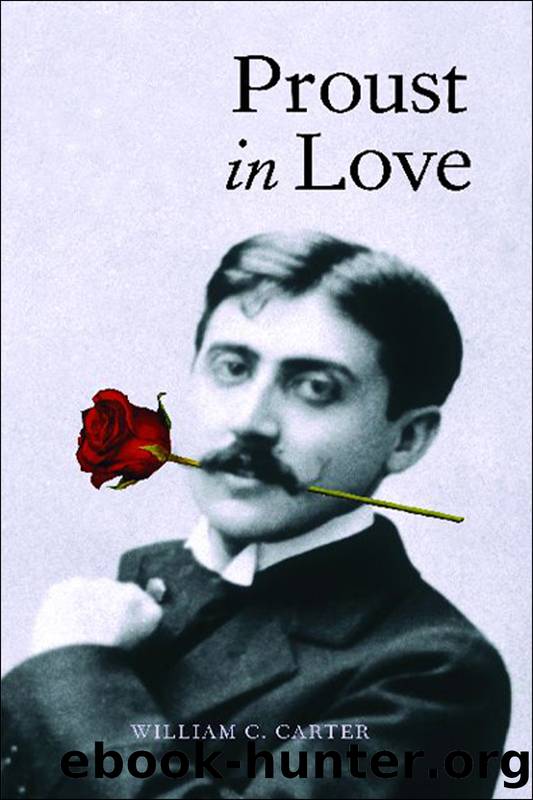Proust in Love by Carter William C

Author:Carter, William C. [Carter, William C.]
Language: eng
Format: epub
ISBN: 9780300134889
Publisher: YaleUP
Published: 2006-09-15T05:00:00+00:00
Proust does not subscribe to the belief that âabsence makes the heart grow fonder.â He has his own theory that he calls the âgeneral law of oblivion.â The absent or the dead are quickly forgotten, not because we are indifferent or callous but because living simply demands that we recover and move on. Ultimately his love for Agostinelli, like the Narratorâs for Albertine, must be forgotten: âI had finally ceased to love Albertine. So that this love . . . had ended . . . by succumbing, like my love for Gilberte, to the general law of oblivion.â36
In late 1917, when Paul Morand prepared to depart for a posting at the French embassy in Rome, Proust sent him a letter in which he referred to the recently published excerpts from the forthcoming volume The Guermantes Way. In this letter, as is not infrequently the case, we see Proust identifying with his Narrator, who finds it impossible to remain faithful to the memory of the dead or the merely absent: âIf you [Morand] read in the N.R.F. the pages in which I show how I finally reconcile myself to the departure of my friends, though the idea that I will so reconcile myself is precisely what saddens me most, you will understand my state of mind when I realize that soon I shall see you no more, and that a day will come when, a new âselfâ having formed, I shall no longer miss you.â37
A half-century later, when Morand lost his beloved wife, Hélène, he found that Proust âhad spoken true.â Morandâs journal entry for May 8, 1975, reads: âOblivion is a form of this awful erosion known as habit. This morning, I posed my lips on the urn containing Hélèneâs ashes without weeping.â He then recalled Proustâs 1917 letter about how helpless one remains before the destructive forces of time that obliterate even the memories of those we hold dearest: âItâs not because youâre leaving for Rome [that makes me sad], itâs because I know that I am going to forget you.â This line of Proustâs becomes something of a motif in Morandâs journal.38 Morand must also have remembered that Proust reprises this theme in The Fugitive, where it becomes even more dominant, when the Narrator discovers himself in the process of forgetting Albertine: âIt is not because other people are dead that our affection for them fades; it is because we ourselves are dying. . . . My new self, while it grew up in the shadow of the old, had often heard the other speak of Albertine; through that other self, through the stories it gathered from it, it thought that it knew her, it found her lovable, it loved her; but it was only a love at second hand.â39
This view is consistent with Proustâs theory of personality, of the multiple selves we each possess, the shifting sentiments, the ebb and flow of emotions: all in keeping with the phenomenon of the âIntermittencies of the Heart,â which Proust
Download
This site does not store any files on its server. We only index and link to content provided by other sites. Please contact the content providers to delete copyright contents if any and email us, we'll remove relevant links or contents immediately.
The Power of Myth by Joseph Campbell & Bill Moyers(1046)
Half Moon Bay by Jonathan Kellerman & Jesse Kellerman(976)
Inseparable by Emma Donoghue(968)
A Social History of the Media by Peter Burke & Peter Burke(966)
The Nets of Modernism: Henry James, Virginia Woolf, James Joyce, and Sigmund Freud by Maud Ellmann(888)
The Spike by Mark Humphries;(798)
The Complete Correspondence 1928-1940 by Theodor W. Adorno & Walter Benjamin(770)
Culture by Terry Eagleton(768)
A Theory of Narrative Drawing by Simon Grennan(767)
Ideology by Eagleton Terry;(728)
World Philology by(709)
Farnsworth's Classical English Rhetoric by Ward Farnsworth(703)
Bodies from the Library 3 by Tony Medawar(700)
Game of Thrones and Philosophy by William Irwin(697)
High Albania by M. Edith Durham(692)
Adam Smith by Jonathan Conlin(683)
A Reader’s Companion to J. D. Salinger’s The Catcher in the Rye by Peter Beidler(670)
Comic Genius: Portraits of Funny People by(642)
Monkey King by Wu Cheng'en(640)
